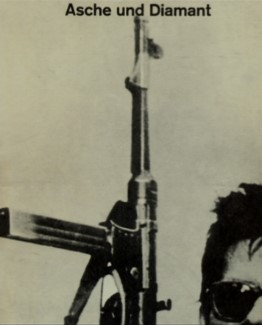
ASHES AND DIAMONDS
Poland, 1958, 105 minutes, Black and white.
Zbigniew Cybulski.
Directed by Andrzej Wajda.
Ashes and Diamonds is the third in a trilogy by Andrzej Wajda about young people in Poland at the end of World War Two.
This film was written by Wajda and Jerzy Andrzejewski, based on his novel. The setting this time is a provincial town, after the peace declaration. Once again the focus is on a nationalist unit, this time underground, and the attempt to assassinate a communist district secretary. The film focuses on the youngest member of the unit, Maciek, played effectively by Zbigniew Cybulski. The film focuses on Maciek and his dilemmas while the social situation changes around him. once again, the end of the film has a pessimistic tone.
1. The impact of the film? Its link with Generation and Kanal?
2. The work of Andrzej Wajda? memoirs of Poland in the early '40s, the end of the war and the resettling of the nation? The film's comment on young Poles, the Nationalist Underground, communist district secretaries and the reorganisation of towns and administrations?
3. Black and white photography, the atmosphere of the '40s, the town, the use of interiors, the contrast with the exteriors?
4. The title and its theme? The ashes of war-torn Poland? The possibility of something rising from these ashes?
5. The first day of peace, the Polish town, the Nationalist Underground unit and its mission, the ambush of Szczuka? The attempt? The death of the two workers? The reaction of Andrzej their leader? The leader demanding the death of Szczuka?
6. The focus on Maciek? His youthfulness? His being commissioned to carry out the assassination? His mission to join Andrzej and the leadership of the resistance group? His moving into the hotel? Next door to his victim? The encounter with Christine? Her visits to his room? Their sexual encounter? The effect on Maciek? His longing for peace? The experience of the victory banquet downstairs? The secretary who belonged to the group? His disgrace? His losing his chance of going to Warsaw? Maciek and his decision about the killing? His change of attitude towards his cause, loss of belief? His criticism of Pole battling against fellow Pole? His having to continue with the mission? The shooting of Szczuka? His going to the square? The attitude of Drewnowski? Maciek running from him? The military patrol? His alarm and his being shot? The pessimism in the death of Maciek?
7. Andrzej and the leadership of the group? The Resistance? Andrzej and his promotion? His refusing to accept Maciek's wanting to back out of the assassination? The clash between Andrzej and Drewnowski?
8. The local authorities? Their place during the war? In peacetime? The banquet? Drewnowski making a fool of himself? His lack of promotion? The Mayor becoming a ministry in Warsaw? Andrzej beating Drewnowski? Drewnowski being the occasion of Maciek's death?
9. Christine and her work in the hotel, the attraction towards Maciek, her relationship with him, his leaving her?
10. The transition from the war situation to peace? The loss of values? Disillusionment? Despair? The possibility of a new society rising from this?